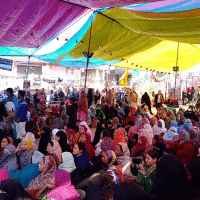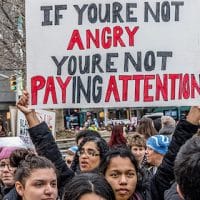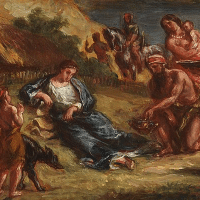-
Popular narrative culture: the haunted mirror of capitalism’s failing social contract
In the post-Christmas edition of the United Kingdom’s daily socialist newspaper the Morning Star, the editorial commented on the holiday television broadcast of the 1983 film Educating Rita. In it, author Jim Leman pointed out that the 1980s story of a mature working-class hairdresser attempting to enter university, encouraged by a benign academic on tenure, could not happen today.
-
Class, Gender, Race & Colonialism: The ‘Intersectionality’ of Marx
It is important to see both Marx’s brilliant generalisations about capitalist society and the very concrete ways in which he examined not only class, but also gender, race, and colonialism, and what today would be called the intersectionality of all of these. His underlying revolutionary humanism was the enemy of all forms of abstraction that denied the variety and multiplicity of human experience. For these reasons, no thinker speaks to us today with such force and clarity.
-
‘We need to talk about abortion as necessary healthcare and a social good’
CounterSpin interview with Kimberly Inez McGuire on abortion realities.
-
Marxism and feminism – Marxism and Women’s Liberation extract
Lindsey German discusses Marxism’s contribution to analyzing women’s oppression in this extract from Marxism and Women’s Liberation
-
A victory for the movement in the streets: inside Argentina’s abortion win
On 30 December, Argentina’s Senate voted to legalise abortion after many years of mass protests around the issue. In the wake of this important victory, Red Flag spoke to Cele Fierro, an activist with the anti-capitalist feminist group Juntas a la Izquierda and a member of the national leadership of the Movimiento de los Trabajadores (MST) in Argentina.
-
Queen of the Bolsheviks
Now forgotten, Dr. Marie Equi (1872–1952) was a physician for working-class women and children, a lesbian, and a dynamic and flamboyant political activist. She was a “firebrand in the causes of suffrage, labor and peace, in Portland in the ’teens, ’20s, and ’30s.” A reformer turned revolutionary, Equi earned the nickname “Queen of the Bolsheviks,” one which spoke to her often imperious character as well as to her politics.
-
Black Women, mothers, workers: The frontlines of the MTST
The reason the MTST is overwhelmingly made up of Black women is precisely because of their role in society. Women are primarily responsible for home life.
-
Indian women revive non-violent civil disobedience movements against the extinguishment of citizenship rights
On 11 December 2019 one of the largest peaceful Civil Disobedience Movements in India after Indian Independence in defence of the Constitution and Constitutional rights, began under the leadership of Indian Muslim women in Delhi.
-
The pillage of resources: A glimpse into the lives and labor of marginalized women
Lives of women dependent on natural resources, such as land, forests, rivers, and mountains, are being tossed asunder by the appropriation and expropriation of these resources by corporations and the state.
-
Silvia Federici: The exploitation of women and the development of capitalism
Federici demonstrates that unpaid labor–especially that of women confined to the domestic sphere and of enslaved workers–is a necessary support for waged labor.
-
The Living Flame: The Revolutionary Passion of Rosa Luxemburg by Paul Le Blanc reviewed by Kaitlin Peters
The collection begins with the essay, ‘Rosa Luxemburg (1871–1919)’, that more broadly reviews Luxemburg’s theoretical contributions and political interventions from 1871 to 1919.
-
Intersectional frameworks and Marxist analysis
This panel will provide an updated reflection on the relationship between Marxism and intersectionality and offer a critical gaze of what intersectionality adds (and possibly subtracts from) contemporary Marxism that is inclusive, enabling and powerful in building political practice.
-
‘This is war’: fighting for abortion rights in Poland
A mass movement in Poland has succeeded in delaying the implementation of a court decision that would ban nearly every abortion.
-
The Past as Prologue: Caliban & the Witch – a Review
Alexandra Day reviews Silvia Federici’s seminal work, Caliban and the Witch: Women, the Body and Primitive Accumulation.
-
An exemplary feminist mobilization
Female school students, with the support of feminist collectives, are mobilizing against sexist punishments put in place by their school management for wearing outfits deemed provocative.
-
It’s all work and no pay for most women in India
The NSSO’s time use survey reveals striking facts about how men and women in India spend their time very differently, with women hugely burdened by unpaid work
-
Darius Simpson & Scout Bostley – “Lost Voices”
Darius Simpson & Scout Bostley – “Lost Voices” (CUPSI 2015)
-
Against advertising
Advertising is a constant feature of our everyday lives. John Molyneux argues that as a result, we often ignore its real and unsavoury function: capitalist propaganda par excellence.
-
Amazon women warriors and revolutionary pants
For much of human history, most people—men and women—wore loose fitting robes of various types to cover their bodies. It is thought that trousers were invented relatively recently in human history, around 1000 BCE, so that people could be more comfortable riding horses.
-
Reform won’t end police sexual violence
The legal right to sexual violence is part and parcel of policing. This will not end until we eliminate police discretion over women’s bodies.




















